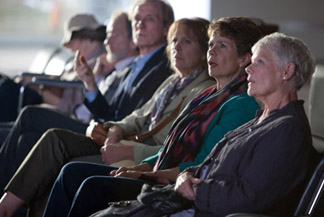Review: The Best Exotic Marigold Hotel
As Sweet and Aromatic as the Flower in its Name
By Tom Houseman
May 15, 2012
BoxOfficeProphets.com

There are a few scenes in which we see wide shots of the majority of the cast sitting complacently, and I wish those shots had been at least three times longer. Just the image of these incredible thespians placed in the same room is mesmerizing, and I could have taken several minutes to just stare at them, examining the contrast between the wrinkles on their faces and the fire in their eyes. These are some of the most iconic British actors of our time, stripped of all pretense. They are not weighed down by extensive prosthetics or heavy period costumes, they do not have to scream or shout or hide behind CGI. They are simply allowed to play real people, people with flaws and fears and desires, and watching them is magical.
Watching these characters wandering through Urban India, their gazes a mix of wonder, fear, and excitement, gives the film limitless for potential for comedy derived from honesty. The plot is very loosely established, without an overarching conflict for the first three quarters of the film. Rather, the film allows us to see the details of the emotional journeys and development of the characters. Occasionally, films that attempt this type of narrative drag, but John Madden is an immensely talented director who understands how to pace his film so that he can show us every important moment, make it clear where the characters are coming from and hint at where they are going, without ever having to slow down the story. At times we move so quickly from scene to scene that the film risks breaking a hip, and I do wish Madden had taken a few more moments to let us absorb everything onscreen, but he erred on the side of efficiency, which was probably the right decision.
And the best decision that he made was to give the actors total freedom to explore the complexities of their characters. Judi Dench is given the most screen time, and the role of narrator, and proves that she is always at her best when she is at her most natural. True she plays pomposity and grandeur as well as anyone, but when we see her weak and vulnerable we see her power as an actress. Her performance as Evelyn, a widow setting out on her own for the first time, is driven by these moments of weakness and vulnerability, and she is extraordinary. I could bring up every actor by name and mention how brilliant they were, but I will simply say that the two actors who were given what could have been one-dimensional parts, Maggie Smith and Ronald Pickup, not only mine their roles for every ounce of comedy, but also every grain of humanity. There is not a character in the film you can't help caring about.
Standing alongside these aging veteran actors is Dev Patel, whose ebullience and eternal optimism create a sharp contrast to the elderly Brits living in the hotel he is attempting to run. I was concerned that Sonny was going to end up being a stereotype, but he is as complex as any other character. It is his conflict that goes into a higher gear when the film needs a push to the finish line, and he is one of the most compelling characters in the film. Watching Patel attempt to always see the glass as half full, even when the glass has shattered and the water has spilled everywhere, is too sweet and charming to resist.
The film's writing occasionally dips into cliché, but what screenwriter Ol Parker (who also wrote the romantic comedy Imagine Me & You) does best is make these cliches feel honest to the characters. When Sonny repeats “everything will be alright in the end, so if it is not alright it is not the end,” we understand that he is saying it not just he believes it, but because he needs to remind himself so he can stay sane. Some of the attempts at clever dialogue are cringeworthy, but most hit their mark, and the film is so packed with sweetness that the occasional misstep is very forgivable. For a film about the over-sixty set, you would not expect The Best Exotic Marigold Hotel to be so full of energy, and yet it is contagiously enthusiastic without ever sacrificing the honesty and sadness of any moment that requires solemnity. While it might not be the most memorable or revelatory film, if you want to smile, laugh, and maybe shed a tear, at a film that is stripped of everything but charm and honesty, it is safe to say that you will love The Best Exotic Marigold Hotel as much as I did.